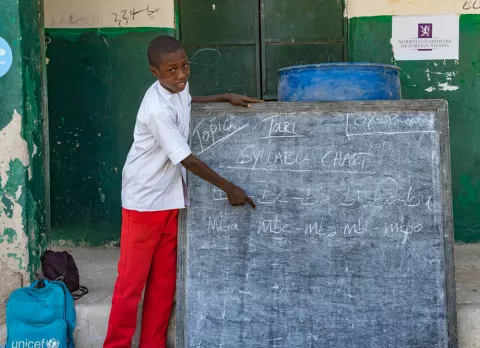Being mentally healthy gives us the ability to enjoy life and cope with good and bad days. For children, it is vital to their ability to understand and manage their emotions, form nurturing and meaningful connections, play, learn and grow.
The pandemic highlighted just how much our mental health is a reflection of the world around us. It isn't just a question of what's going on in a child's or adolescent's mind, it is also the conditions in which they live – their experiences with parents and caregivers, the friendships they build, the resources they have access to and their chances to develop to their full potential. Being mentally healthy at the early life stage instills the capacity to be mentally healthy throughout life.
Globally, over 250 million children and adolescents experience mental health conditions, many of which have gone undiagnosed and untreated. Half of all lifetime mental health conditions emerge before age 14 and grappling with conditions like depression, stress and anxiety in childhood and adolescence has been linked to worse life outcomes.
It is increasingly clear that we cannot truly address the mental health of children and adolescents without putting our focus on the fundamentals of care, how it is received, who gives it and the socioeconomic factors which support it.
Getting it right early is critical. And it starts at home.
"[W]e cannot truly address the mental health of children and adolescents without putting our focus on the fundamentals of care"
It starts at home
Safe and nurturing environments at home are fundamental to the emotional and psychological development of children and adolescents. The presence of a stable adult caregiver supports children’s and adolescents’ overall sense of wellbeing. In times of crises, re-establishing routines supports a child’s or adolescent’s coping and recovery.
While caring for a child can be hugely rewarding, without adequate support measures, caregivers can become stressed, overworked, and be forced to make difficult compromises that jeopardize their mental health and the developmental well-being of the child.
Adolescent mothers are particularly at risk as they undergo maternal roles and the emotional, physical, cognitive changes of adolescence, simultaneously. In many contexts adolescent mothers also face social isolation and mental distress due to the shame, guilt and fear associated with early motherhood. Globally in 2021, an estimated 14 per cent of adolescent girls and young women give birth before age 18.
Caring for the caregiver
Research shows that supporting the mental health of parents and caregivers can avert instances of abuse, neglect, and adverse experiences during childhood.
When parents are supported and enabled to parent well, everyone benefits. Evidence-based parenting interventions have a positive impact on the mental well-being of both the caregivers and their children, mitigating risk-taking behaviors across the entire lifespan.
Moreover, once the initial investment is made, the cost of implementing parenting interventions per family is similar to that of a routine childhood vaccination programme. This evidence highlights the cost-effectiveness and long-term benefits of incorporating parenting interventions into broader public health strategies.
"When parents are supported and enabled to parent well, everyone benefits."
Family-friendly policies
The bottom line is that caregivers need time, resources and services to be the very best they can be. Family-friendly policies, defined as those which enable families to reconcile work and family life, are essential in this context.
Family-friendly policies, including paid parental leave; access to affordable, quality childcare; breastfeeding and nutrition support; and child benefits, alongside living wages, maternity protection and flexible working policies, have significant ramifications on mental health outcomes for caregivers – and by extension their children.
To be truly transformative, family-friendly policies are envisioned as a holistic and balanced package with core components that support and complement each other, while accommodating a variety of contexts, family forms and workplace realities.
Paid parental leave has been shown to improve mothers’ physical and mental health, enable fathers to bond with their children, and allow for more equal distribution of care responsibilities, which is critical to facilitate the mental health of caregivers, familial well-being and child development outcomes.
Affordable, quality childcare provides parents with the opportunity to engage in the workforce while also bonding and building strong, close relationships with their children by supporting their health, nutritional, safety and developmental needs.
"The bottom line is that caregivers need time, resources and services to be the very best they can be."
As women and girls disproportionately carry the burden of care in the home, childcare provides a relief from caregiving responsibilities to enable them to work and pursue life beyond the domestic sphere, supporting their mental health and giving important time to rejuvenate.
For adolescent caregivers, such policies can enable healthier, safer and more economically secure transitions to adulthood, with dividends for themselves, their children and wider communities.
Access to care also ensures adolescents can continue education, vocational training, or other enriching pathways. Adolescent mothers continuing in education reduces the likelihood of multiple pregnancies, exploitation, and reduces the likelihood of their daughters becoming adolescent mothers—thus disrupting the cycle of intergenerational poverty.
Working parents who earn living wages and receive child benefits are better able to afford the basic necessities for their families and escape working poverty. The stress of poverty can disrupt caregivers’ capacity to consistently provide positive parenting, an essential component of brain development and mental health. Income security equips working parents to save for financial shocks and emergencies, ensuring children are at less risk of instability and further poverty during economic hardship.
Social protection – from child benefits and school feeding programmes, to maternity and parental leave benefits and affordable, quality childcare – are an essential right for every child and caregiver.
The role of government and business
Despite the clear benefits of family-friendly policies for children, families, businesses and economies at large, progress in the business and public policy spaces is lacking.
Globally, the vast majority of working parents and caregivers have no or insufficient access to family-friendly policies, especially in informal work settings that fall outside the remit of labour market institutions.
Governments and businesses play a pivotal role in creating enabling environments for parents that support them to give their children the best start in life. Now more than ever, greater investment and joint action are needed to ensure family-friendly policies are meaningfully implemented across all family and workplace realities – in the informal economy as well as formal, for caregivers of all kinds and in all families, including those with disabilities.
"Globally, the vast majority of working parents and caregivers have no or insufficient access to family-friendly policies"
Acting early to support children and caregivers is the best investment that governments and businesses can make to promote mental health for caregivers, and a whole range of critical developmental outcomes for children.
Doing so means no longer considering mental health responses purely as the domain of psychologists and parenting classes. Economic realities and the burden of care on adolescent girls and women must be reckoned with if we are to get serious about caregiver’s mental health.
The evidence is there: Family-friendly policies must be part of the solution, providing a solid foundation upon which children, parents and entire economies stand to gain.
> Related: Universal parenting support to prevent abuse and neglect - A policy call for national governments
Authors and contributors
Oluwatosin Akingbulu, Advocacy and Communication Specialist, UNICEF
Dr. Marcia Brophy, Mental Health and Psychosocial Support (MHPSS) and Innovation Specialist, UNICEF
Clara Ceravolo, Social Protection and Gender Consultant, UNICEF
Ruth Graham-Goulder, Senior Adviser on Gender, UNICEF
Dr. Zeinab Hijazi, Senior Mental Health Technical Advisor (Global Lead on Mental Health), UNICEF
Aabha Khatri, Gender Consultant, UNICEF
Christopher Kip, Corporate Alliances Specialist, UNICEF
Caleb Segun Lean, Corporate Alliances Consultant, UNICEF
Chemba Raghavan, Senior Adviser on Early Childhood Development, UNICEF
Lauren Whitehead, Social Protection and Gender Lead, UNICEF





